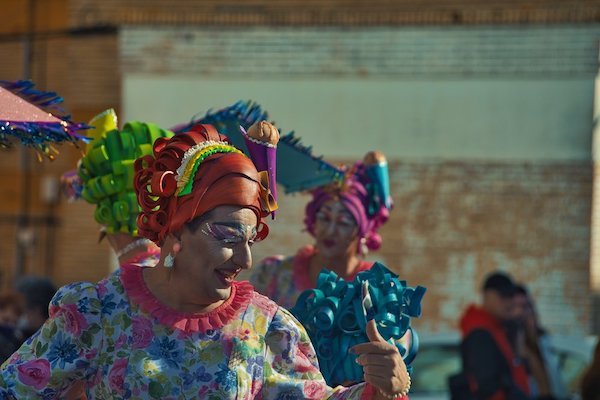Borrow Bravery
There are currently 321 anti-LGBTQ bills in the hands of United States lawmakers as of the writing of this blog.
Most of them are anti-trans. Many of them are aimed at drag performers and the communities they serve.
On the same day, RuPaul’s Drag Race is in it’s 15th US season, and 29 spinoffs are watched in dozens of countries around the world. One of my favorite drag queens, who I saw perform in the most gorgeous holiday show in Decemeber, is now performing in Chicago on Broadway. In some ways drag is more accepted than ever. And yet, there are people who would criminalize and art form that has helped and even saved so many.
I’d never seen a drag show when I first heard about RuPaul’s Drag Race. In 2010, the show aired on a tiny little box on the website for logotv.com. I heard about on a tv podcast I used to listen to while cleaning my tiny cottage in Armenia. When I was medically evacuated for surgery to DC, I laid awake at night watching episodes from the two seasons that had aired online, binging them between the same repeating commercial for Orbitz.
I was in heaven watching those queens. Performers like Ongina, Miss Tammie Brown, Raven, Jujubee… Here I’d been, this terrified, small-town Texas closeted gay boy all my life, just out-of-the-closet and living in a tiny little Northern Armenian town. Now, in my hotel room in Georgetown, laid up from surgery with nowhere to go, I could watch these gay men and trans women not only perform, but talk about what they’d been through in their lives and how they channeled all of it into making art. Like alchemy, they created performances that took their pain and transformed it into joy, nerve, wit and community. At the end of each episode, the host, RuPaul, said (and still says), “If you can’t love yourself, how the hell are you gonna love somebody else?”
I watched each episode, each of them water on the seed of two ideas. One, that I needed to get on a mission to learn how to really love myself so that I could more truly love other people. Second, that if these queens could be the truest versions of themselves, I could, too.
I felt more brave just watching them, their “damn the torpedoes” attitudes toward what might come their way simply because of who they are and how freely they express it.
I was able to borrow their bravery.
I shared on Instagram this week a few words from the Author’s Note of my upcoming book in light of the anti-Drag bills being turned into law this week. Those laws are a horrifying reminder that so many people still wish queer people harm, would use hate to advance themselves no matter the suffering it causes.
Yet in the midst of that, I borrow bravery. Here is the quote from my book about how queer art helped me before I came out:
Before I came out, especially in college and beyond, I quietly sought out gay stories. Alone in my apartment, I watched Milk and Philidelphia and Angels in America. I read Me Talk Pretty One Day and I Am Not Myself These Days. When I couldn’t answer the survival question for myself, the stories of queer people have helped make me more brave and less alone. I’m adding my own story to the centuries of stories of queer people in hopes that when you, dear reader, look yourself in the mirror, you might feel more brave and less alone. If you’re gay or trans or different or are simply looking in the mirror having a hard time making it, borrow bravery.
When you are scared, borrow the bravery of queer artists and storytellers brave enough to share their stories with you.
Borrow bravery.
